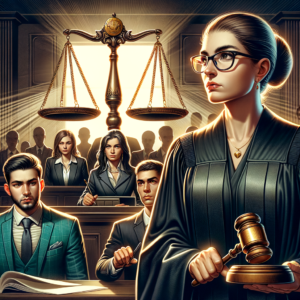Unraveling the Erosion of Civil Liberties: A Stark Warning for Democracy
[caption id="attachment_71135" align="alignnone" width="695"] Judge[/caption]
In recent years, the erosion of civil liberties has emerged as a pressing concern for democracies worldwide. As governments grapple with issues ranging from national security to public health, the delicate balance between safeguarding citizens and upholding their rights has become increasingly precarious. This article aims to explore the foundational role of civil liberties in democratic societies, trace their historical evolution, identify current threats, examine the impact of technology, and ultimately call for a concerted effort to protect these essential rights for future generations.
Understanding Civil Liberties: The Foundation of Democratic Society
Civil liberties are the fundamental rights and freedoms that protect individuals from government overreach and ensure the autonomy of citizens within a democratic framework. These rights, often enshrined in constitutions and international treaties, include freedom of speech, the right to privacy, freedom of assembly, and the right to a fair trial. They serve as a bulwark against tyranny and oppression, allowing individuals to express dissent, participate in governance, and hold authorities accountable. In essence, civil liberties are not merely legal protections; they are the bedrock upon which democratic societies are built, fostering an environment of trust, participation, and civic engagement.
Historical Context: How Civil Liberties Have Evolved Over Time
The evolution of civil liberties can be traced back to pivotal moments in history, such as the Magna Carta in 1215, which established the principle that everyone, including the king, is subject to the law. Over the centuries, various movements and revolutions have shaped the landscape of civil rights, from the Enlightenment's emphasis on individual freedoms to the civil rights movements of the 20th century that sought to dismantle systemic discrimination. Each era has witnessed the expansion of civil liberties, often in response to authoritarianism and injustice. However, this progress has not been linear; periods of regression, particularly during times of war or political upheaval, have highlighted the fragility of these rights and the ongoing struggle to secure them for all citizens.
Current Threats: Identifying Forces Eroding Civil Liberties Today
Today, civil liberties face an array of threats that undermine their integrity and accessibility. Authoritarian regimes have increasingly employed legal and extralegal measures to suppress dissent, curtail freedom of expression, and stifle political opposition. In established democracies, the rise of populism and nationalism has led to the erosion of rights through discriminatory policies and rhetoric. Additionally, the normalization of emergency powers during crises, such as the COVID-19 pandemic, has raised alarms about the potential for permanent encroachments on civil liberties. These forces, both domestic and international, pose significant challenges to the preservation of democratic values and the protection of individual rights.
The Role of Technology: Surveillance and Its Impact on Privacy Rights
The rapid advancement of technology has introduced a new dimension to the erosion of civil liberties, particularly concerning privacy rights. Governments and corporations now possess unprecedented capabilities for surveillance, data collection, and analysis, often justified in the name of security and efficiency. The proliferation of digital technologies has blurred the lines between public safety and personal privacy, leading to a culture of constant monitoring. This surveillance state not only infringes upon individual freedoms but also creates a chilling effect on free expression and dissent. As citizens become increasingly aware of their digital footprints, the implications for privacy and civil liberties become more pronounced, necessitating a critical examination of the ethical and legal frameworks governing technology use.
Consequences of Erosion: Implications for Democracy and Governance
The erosion of civil liberties carries profound implications for democracy and governance. When individuals are unable to express dissent or challenge authority without fear of reprisal, the very essence of democratic participation is compromised. This stifling of free speech and assembly can lead to a disengaged citizenry, weakened institutions, and a decline in public trust. Furthermore, the normalization of rights violations can create a slippery slope, where the gradual encroachment on liberties becomes accepted as a necessary trade-off for security or stability. Ultimately, the health of a democracy hinges on the protection of civil liberties; their erosion threatens not only individual rights but the collective fabric of society.
A Call to Action: Protecting Civil Liberties for Future Generations
In light of these challenges, it is imperative that citizens, policymakers, and civil society organizations unite to protect and promote civil liberties. This requires a multifaceted approach, including advocacy for robust legal protections, increased transparency in government actions, and public education on the importance of civil rights. Engaging in grassroots movements, supporting organizations dedicated to civil liberties, and holding elected officials accountable are essential steps in this endeavor. As history has shown, the safeguarding of civil liberties is a continuous struggle that demands vigilance and commitment. By prioritizing the protection of these rights, we can ensure that future generations inherit a democracy that values and upholds the principles of freedom, justice, and equality.
The erosion of civil liberties poses a significant threat to the foundations of democracy, requiring urgent attention and action from all sectors of society. As we navigate the complexities of the modern world, it is crucial to remember that the protection of individual rights is not merely a legal obligation but a moral imperative. By fostering a culture of respect for civil liberties, we can work towards a more just and equitable society, ensuring that democracy remains vibrant and resilient in the face of adversity.
